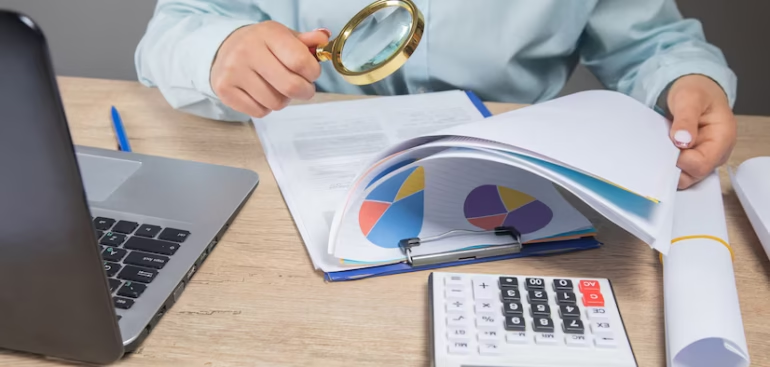Forensic Accounting Audit: Unlocking the Power of Fraud Detection and Prevention
In today’s business world, integrity and transparency are paramount. Companies and organizations are under increasing pressure to maintain proper financial practices, mitigate risks, and safeguard their assets. A forensic accounting audit plays a pivotal role in achieving these objectives. With fraud and financial misconduct becoming more sophisticated, it’s essential for businesses to implement thorough measures to detect and prevent fraud. Forensic accounting audits help uncover hidden financial discrepancies, offering businesses and organizations the tools needed to protect their financial well-being and reputation. These audits are designed to trace fraudulent activity, identify financial wrongdoing, and provide comprehensive reporting for legal proceedings. This blog explores the vital aspects of forensic accounting audits, the role of fraud stoppers, and why investing in such services is crucial for maintaining business integrity.
What is a Forensic Accounting Audit?
A forensic accounting audit is a detailed, investigative process that combines accounting expertise with investigative techniques to uncover financial fraud, irregularities, and misconduct. Unlike regular financial audits that focus on assessing general financial health, forensic accounting audits are specifically designed to investigate suspected fraud or illegal activities, providing businesses with clear evidence for legal purposes.
The forensic accounting audit process is typically conducted when there is a concern about potential fraud, embezzlement, money laundering, or other financial crimes. The audit involves examining financial records, transactions, and processes to identify any anomalies or discrepancies that could indicate fraudulent activity. Forensic accountants often work closely with law enforcement agencies, legal professionals, and businesses to provide findings that can be used in court or other legal proceedings.
The primary goal of a forensic accounting audit is to detect fraudulent financial activities, but it can also help businesses uncover inefficient financial processes, control weaknesses, and potential vulnerabilities in their operations. Through meticulous analysis, forensic accountants provide businesses with a roadmap for strengthening their internal controls, safeguarding against future fraud, and ensuring compliance with regulatory requirements.
How Forensic Accounting Audits Help in Fraud Detection and Prevention
Fraud can have devastating consequences for businesses, leading to financial losses, reputational damage, and legal consequences. Forensic accounting audits are a critical tool in detecting and preventing fraudulent activities. Through specialized skills and techniques, forensic accountants are trained to spot financial red flags that may go unnoticed in routine financial audits. Let’s explore some of the ways forensic accounting audits contribute to fraud detection and prevention.
- Detailed Transaction Analysis: Forensic accountants analyze every transaction, account entry, and financial record to detect unusual patterns. These detailed analyses allow them to identify discrepancies, such as falsified invoices, ghost employees, or inflated expenses that could indicate fraudulent activities. Regular audits may overlook these subtle signs of fraud, but forensic accounting audits dig deeper into the data to uncover hidden irregularities.
- Tracing Fraudulent Funds: One of the primary objectives of a forensic accounting audit is to trace the flow of money involved in fraudulent activities. This process can involve following the trail of illicit funds across multiple accounts, jurisdictions, and entities. By tracking the movement of money, forensic accountants can uncover the perpetrators behind the fraud and provide critical evidence to support legal action.
- Identifying Weaknesses in Internal Controls: Forensic accounting audits are also valuable for identifying areas where a business’s internal controls may be vulnerable to manipulation. These audits analyze the structure of an organization’s financial systems and processes to pinpoint weaknesses that fraudsters could exploit. Once these vulnerabilities are identified, businesses can implement stronger safeguards to prevent future fraud attempts.
- Exposing Complex Fraud Schemes: Some fraud schemes are intricate and involve multiple parties or layers of deception. Forensic accountants are skilled at unraveling these complex frauds, identifying key players, and providing a clear understanding of how the fraud was executed. Whether it’s a Ponzi scheme, asset misappropriation, or financial statement manipulation, forensic accountants use advanced techniques to expose even the most complicated fraudulent activities.
- Providing Evidence for Legal Proceedings: In many cases, the goal of a forensic accounting audit is not just to identify fraud but to provide evidence that can be used in legal proceedings. Forensic accountants prepare detailed reports that document their findings, including how the fraud occurred, who was involved, and the financial impact. These reports are often used as evidence in court to hold individuals accountable for their fraudulent actions.
Fraud Stoppers: The Role of Forensic Accountants in Preventing Fraud
Fraud stoppers play an essential role in preventing financial crimes and ensuring that businesses remain protected. Forensic accountants are not just reactive; they also adopt a proactive approach to fraud prevention. By analyzing financial data, identifying potential vulnerabilities, and establishing preventive measures, forensic accountants help businesses safeguard their financial integrity. Here’s how they act as fraud stoppers.
- Developing Anti-Fraud Policies: A key component of fraud prevention is the creation and implementation of anti-fraud policies. Forensic accountants work with businesses to develop comprehensive anti-fraud strategies that address both internal and external threats. These policies can include strict procedures for handling financial transactions, employee background checks, and regular audits to ensure that employees and vendors adhere to ethical standards.
- Training Employees on Fraud Awareness: One of the most effective ways to prevent fraud is by educating employees about the risks and signs of fraudulent activities. Forensic accountants can provide training sessions to help staff understand the importance of following company policies, recognizing suspicious behavior, and reporting potential fraud. Empowering employees with knowledge is a powerful deterrent against fraudulent behavior.
- Implementing Robust Internal Controls: Forensic accountants help businesses design and implement strong internal control systems that make it more difficult for fraud to occur. These controls include measures such as segregation of duties, multi-step approval processes, regular reconciliation of accounts, and the use of technology to track transactions. By establishing a culture of accountability and transparency, businesses can minimize the likelihood of fraud.
- Conducting Ongoing Monitoring and Surveillance: Fraud prevention doesn’t stop after the initial audit or policy implementation. Forensic accountants regularly monitor financial transactions and operations to detect potential fraud. This ongoing surveillance allows businesses to identify red flags early and take corrective action before fraudulent activities escalate. By continuously assessing financial data, forensic accountants can provide businesses with the peace of mind that their finances are secure.
- Conducting Whistleblower Investigations: In some cases, employees or other stakeholders may uncover fraud but fear retaliation if they report it. Forensic accountants can conduct confidential whistleblower investigations to encourage the reporting of suspicious activities without fear of repercussions. This creates an environment where employees feel comfortable bringing potential fraud to light, enabling businesses to act quickly and prevent further damage.
Why Forensic Accounting Audits Are Essential for Businesses
Forensic accounting audits offer a range of benefits that go beyond simply detecting fraud. These audits can help businesses protect their financial assets, maintain regulatory compliance, and build a culture of integrity. Here are some compelling reasons why forensic accounting audits are essential for businesses of all sizes.
- Minimizing Financial Losses: Fraud can result in significant financial losses for businesses. Forensic accounting audits help businesses identify fraudulent activities early, minimizing the amount of money lost and preventing further financial damage. By catching fraud in its early stages, businesses can take corrective actions to protect their assets and prevent a larger-scale loss.
- Safeguarding Reputation: A company’s reputation is one of its most valuable assets. Fraud can damage a business’s reputation, leading to a loss of customer trust and loyalty. By investing in forensic accounting audits, businesses can protect their reputation by ensuring that they are transparent, ethical, and committed to maintaining financial integrity. A reputation for strong fraud prevention and detection can be a competitive advantage.
- Ensuring Legal Compliance: Many industries are subject to strict financial regulations and compliance requirements. Failure to comply with these regulations can lead to legal consequences and penalties. Forensic accounting audits ensure that businesses comply with relevant laws and regulations, reducing the risk of legal trouble. These audits also help businesses identify areas where they may be at risk of non-compliance, enabling them to take corrective actions before issues arise.
- Improving Operational Efficiency: Through the process of conducting a forensic accounting audit, businesses can uncover inefficiencies in their financial operations. These audits provide valuable insights into areas where processes can be streamlined or improved, leading to better financial management and resource allocation. By improving operational efficiency, businesses can enhance their bottom line and reduce the risk of fraud.
- Providing Peace of Mind: Fraud can be a source of constant worry for business owners and managers. Forensic accounting audits offer peace of mind by ensuring that financial records are accurate, internal controls are effective, and the risk of fraud is minimized. Knowing that a professional forensic accounting audit has been conducted gives businesses the confidence to focus on their core operations without the looming threat of fraud.
Conclusion: Protect Your Business with Forensic Accounting Audits
In today’s business environment, financial integrity is critical. Forensic accounting audits offer an effective way to detect, prevent, and address fraud, providing businesses with the tools they need to safeguard their assets and maintain compliance with regulations. These audits go beyond traditional financial reviews by offering in-depth investigations into financial transactions, internal controls, and operational processes. Fraud stoppers, such as forensic accountants, play a vital role in identifying vulnerabilities, implementing preventive measures, and ensuring that businesses remain protected from financial misconduct.
Whether you’re looking to uncover hidden fraud, improve your financial processes, or ensure compliance with regulations, forensic accounting audits are an essential investment for your business. Don’t wait until it’s too late—take proactive steps to protect your financial future.
Contact us today at (877)-399-2995 or visit Mortgage Audits Online to learn more about how forensic accounting audits can help your business thrive.







